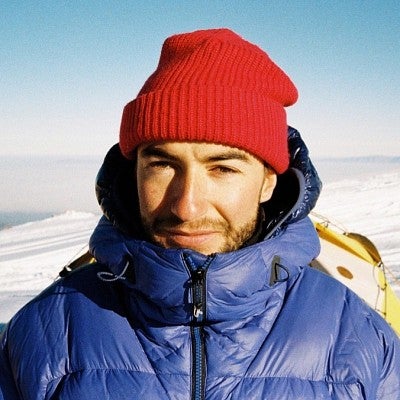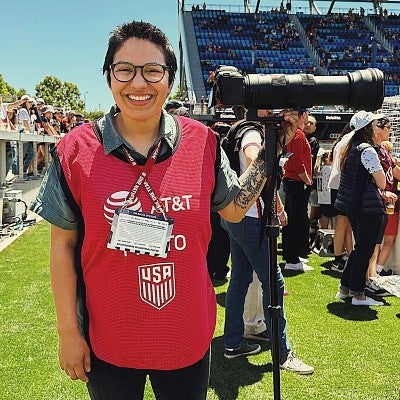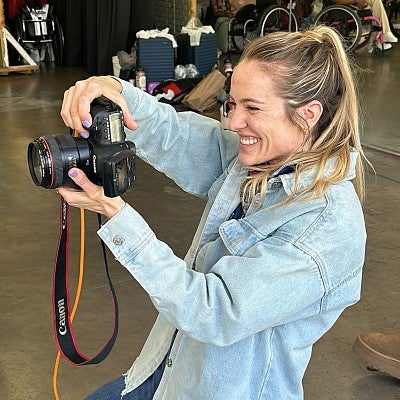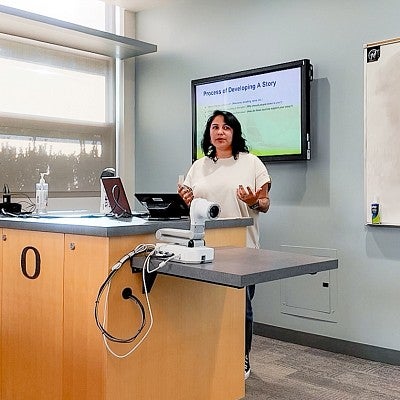Successful alumni offer tips on the ins and outs of profitable freelance journalism.
by Ethan Donahue, class of ’26
Not every journalist shows up to work each day in a bustling newsroom, where they confer with editors, conduct interviews and collaborate with photographers, videographers and graphic artists before tapping out their stories on a laptop alongside other reporters. In fact, a whopping 34% of journalists today work as freelance writers and photographers, according to the Pew Research Center.
That trend inspired Professor of Practice Torsten Kjellstrand to develop a short course he’s piloting winter and spring terms called the Business of Journalism. The aim is to prepare students for the ever-changing world of freelance journalism.
“To thrive in today’s media market, emerging journalists need to know not just the skills and sensibilities of journalism but also how to run a business,” Kjellstrand said. “My hope is that this class helps our students take the first steps toward sustainable careers in our profession.”

SOJC alums offer advice to future freelance journalists
The course is a two-credit, five-week class that features accomplished freelancers as guest speakers who also happen to be alums from the UO School of Journalism and Communication (SOJC).The class debuted winter term, and Kjellstrand plans to continue workshopping it and eventually make it a term-long class.
The goal is to teach students how to make a living as freelance writers and photographers, and it covers practical advice, such as how to set up a business, build project budgets and negotiate contracts.
As students worked on their final projects, they gained insight from guest lecturers and feedback from classmates as well as Kjellstrand.
During winter term, three guest lecturers — Will Saunders ’16, Jackie Gutierrez ’21 and Alisha Jucevic ’14 — shared their personal stories and tips with the class.
“The guests who offered their time to us are among the many SOJC alums who make a living running their own businesses on their own terms,” Kjellstrand said. “They’re an exciting bunch — and I hope some of that enthusiasm rubs off on our students and gives them confidence. When I reached out to these alums, they were super enthused. I was worried about asking for too much time from busy freelancers, so I asked for 30 minutes. Every one of them said something like, ‘Oh, no. Your students need to know this stuff. Give me the full class time.’ What am I going to say to that?”

Will Saunders ’16
photographs elite brands
Will Saunders owns Will Saunders Photography and produces photo work for brand collaboration projects. Saunders was the overall winner of Red Bull Illume’s 2021 photo contest and has produced photo packages for companies like Arc’teryx, The North Face and Gregory Packs. Saunders offered prospective freelancers two main tips:
- Market your strengths. Be confident when interacting with those interested in your work.
- Never stop looking for work. Saunders emails marketing departments of brands he wants to collaborate with to get his name out there, even if he’s currently working on a job.
“Be fresh in their minds,” Saunders said. “Introduce yourself without asking if they have work for you. Be a person and give them a reason to remember your name when projects come around.”

Jackie Gutierrez ’21
freelances for Forbes
Jackie Gutierrez, who graduated from the SOJC’s Journalism Master’s program in 2021, owns Women Kick Balls, a company focusing on women’s soccer. Gutierrez works as a freelance writer for Forbes and has self-published two volumes of Women Kick Balls magazine, one in 2022 and one in 2023.
Gutierrez emphasized the importance of building relationships. Here are her two tips:
- Don’t start off with a sales pitch. “Don’t pitch to people when you’re first making a connection — be friendly and make a lasting impact,” she advised.
- Consider the source of criticism. “Whenever you get critiqued, think about who is giving it to you,” Gutierrez said. “Would you go to them for advice? If not, then move on.”
As someone who runs her own company, Gutierrez is constantly expanding. The company started as a site where people could get free access to women’s soccer news. The site now also sells merch and coffee to generate revenue.

Alisha Jucevic ’14
shoots photos for publications and brands
Alisha Jucevic worked as a staff photographer for The Dubois County Herald and The (Vancouver) Columbian before transitioning to freelance photography in 2020. Her work has been published in The New York Times and ESPN, and she has collaborated with brands like Patagonia Kids.
Jucevic offered these two tips:
- Pursue topics you’re passionate about. You’ll enjoy the work more if it’s a topic that speaks to you.
- Know your worth. When possible, negotiate with companies that are interested in collaborating.
Jucevic also noted the inconsistency of work that many freelancers face, which tends to discourage journalists when they first enter the field. But Jucevic said that “doing smaller jobs while getting your freelance life started is normal. Find ways to pay the bills while getting your work out there.”
For college students — specifically UO students with access to the J-Cage equipment checkout — Jucevic recommended “trying to do a personal project or two. Find something that would contribute to your portfolio. Rent the gear while you have access and get stuff you like on your portfolio.”
Pitching and budgeting are part of being a paid storyteller
“One of the great things about the visitors is that they show our students that there is an SOJC support system out there,” Kjellstrand said. “Every one of our guests invited students in the class to keep in touch as they launch their careers. We pass along our students to our alums to keep this profession healthy.”
Students learn to write a pitch and build budgets using BlinkBid, a website for managing the business side of bidding. Each student in the class received a free two-year subscription to BlinkBid.

“To be honest, I was surprised by how engaged the students were in this class,” Kjellstrand said, adding that pitching, budgeting and scheduling are his least favorite parts of the job.
“These students understand the importance of running a thriving business so that they can do the work they find most compelling, important and satisfying,” Kjellstrand said. “The final projects convinced me that these emerging journalists can go out there and do the work necessary to support a thriving democracy. That gives an aging journalist like me hope.”
The class culminated in a final project, which required them to come up with a budget, a list of deliverables, a timeline and the name of a publication each student would pitch to. Kjellstrand offered to support students who wanted to continue building their project and pitch it after the class ended.
“My hope is that this class helps prepare our students to be professional — as in make-a-living — journalists in the freelance space,” Kjellstrand said. “Because the economics of news and media are changing, fewer and fewer of our students will find a place at newspapers and news magazines. But now more than ever we need a new generation of strong journalists able to sustain themselves from their work. The students know this, which is why they showed genuine enthusiasm for a class that is mostly about budgeting and scheduling — they know that these less-than-invigorating skills can make possible the important journalism we need them to do in the years ahead.”
Ethan Donahue is a journalism major with a double major in history. He is part of the School of Journalism and Communication’s direct-admit and honors programs. He is also part of the Clark Honors College. He is interested in investigative and conflict journalism and is working on a thesis focusing on how journalism, propaganda and the U.S. government interact during conflicts.
